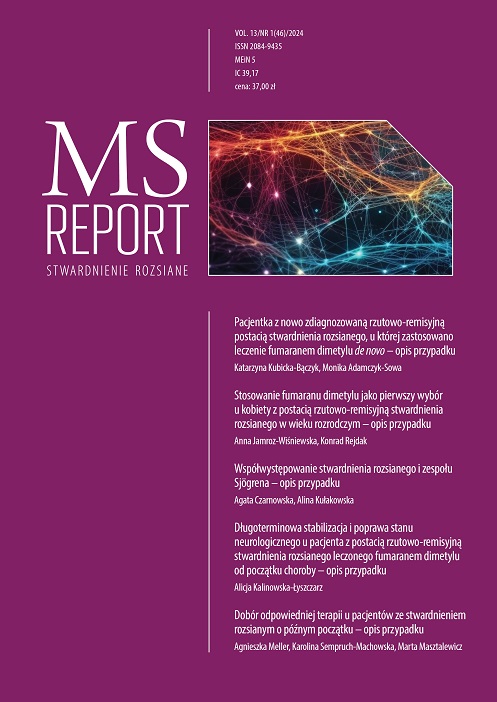Dimethyl fumarate use as the first choice in a woman with relapsing-remitting type of multiple sclerosis in childbearing age – case report Case report
Main Article Content
Abstract
Relapsing-remitting type of multiple sclerosis often occurs in young women in childbearing age. That is why immunomodulating treatment preventing the progression of disease that enables conception without suspending the treatment before it, is beneficial especially for this group of patients. We present a case of a young woman that is treated with dimethyl fumarate since 2018. Then, at the age of 20, after diagnosis of relapsing-remitting multiple sclerosis, the treatment with dimethyl fumarate was introduced. After about 1.5 year of therapy the patient got pregnant and the treatment was suspended. She bore two healthy children with interruption in dimethyl fumarate treatment. After the second delivery she had a relapse of disease. Because of breastfeeding, bridging therapy with glatiramer acetate was used. At present, the treatment is being switched to dimethyl fumarate again. This treatment enabled the patient delivery of two children without interruption in the treatment before pregnancy.
Article Details
Copyright © by Medical Education. All rights reserved.
References
2. Hellwig K. Pregnancy in multiple sclerosis. Eur Neurol. 2014; 72(suppl 1): 39-42. http://doi.org/10.1159/000367640.
3. Thöne J, Thiel S, Gold R et al. Treatment of multiple sclerosis during pregnancy – safety considerations. Expert Opin Drug Saf. 2017; 16(5): 523-34. http://doi.org/10.1080/14740338.2017.1311321.
4. Yeh WZ, Widyastuti PA, Van der Walt A et al.; MSBase Study Group. Natalizumab, Fingolimod and Dimethyl Fumarate Use and Pregnancy-Related Relapse and Disability in Women With Multiple Sclerosis. Neurology. 2021; 96(24): e2989-3002. http://doi.org/10.1212/WNL.0000000000012084.
5. Hellwig K, Rog D, McGuigan C et al. An international registry tracking pregnancy outcomes in women treated with dimethyl fumarate. Neurology. 2020; 94(15 suppl): 1003.
6. Carta S, Ferraro D, Ferrari S et al. Oligoclonal bands: clinical utility and interpretation cues. Crit Rev Clin Lab Sci. 2022; 59(6): 391-404. http://doi.org/10.1080/10408363.2022.2039591.

